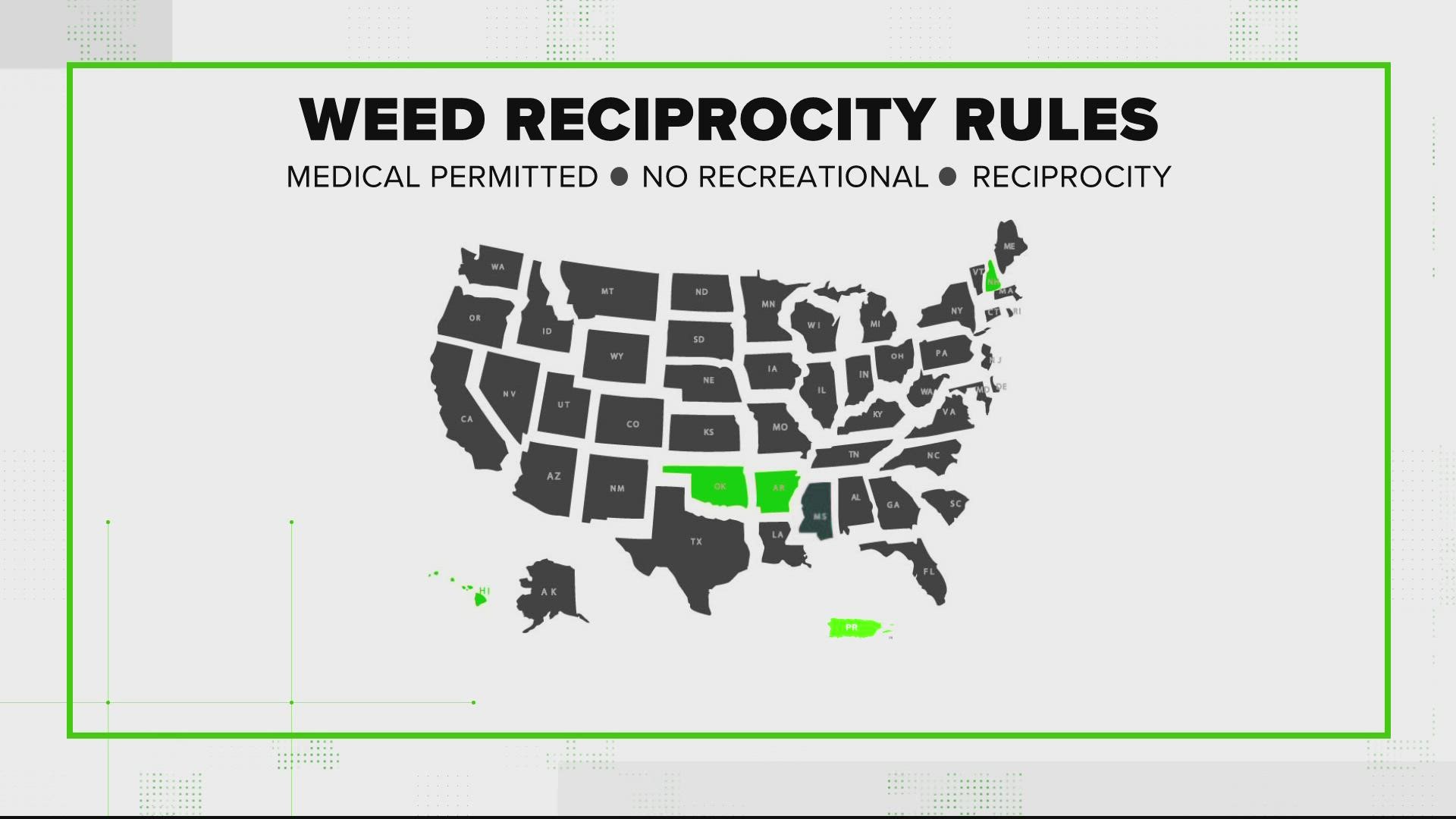WASHINGTON — D.C. is a particular case when it comes to marijuana laws – as a federal district, the recreational sale of weed is still technically illegal, but possession is decriminalized under Initiative 71, which is why many “gifting” stores have become popular in the last few years.
But this “gray market” for pot is loosely regulated, and the DC Council has repeatedly tried to formally legalize recreational sales. Their newest solution: allow D.C. residents to “self-certify” the need for a medical marijuana license, circumventing the need for a doctor’s referral and essentially opening up D.C.’s regulated medical program to recreational users. This new law went into effect on June 28.
But how exactly will these new med cards play across state lines?
THE QUESTION:
Can you use your “self-certified” DC medical cannabis card in other states?
THE SOURCES:
- The Maryland Medical Cannabis Commission
- The Virginia Code
- The West Virginia Department of Health and Human Resources
- The Arkansas Department of Health
- The Oklahoma State Department of Health
- The New Hampshire Department of Health and Human Services
- The Puerto Rico Department of Health
- Hawaii Department of Health
THE ANSWER:
Yes – you can use medical cannabis with your “self-certified” card in certain states.
WHAT WE FOUND:
We started off by looking at Maryland, Virginia and West Virginia– the states where DC residents would most likely use their med cards. But all three states do not offer reciprocity for medical cannabis – that is, any out-of-state cardholder cannot purchase medical cannabis programs there.
That’s according to Maryland’s Medical Cannabis Commission, the Virginia Code and West Virginia’s Department of Health and Human Resources.
We then focused on states with medical cannabis programs that offer reciprocity. Keep in mind these places do not have recreational programs. These medical-only states include Arkansas, Oklahoma, Hawaii, and New Hampshire. It also includes Puerto Rico, a U.S. territory.
Most of these places confirmed that D.C. cards would continue to be accepted.
Note that in many cases, out-of-state residents must pre-register with the respective departments to be able to use their out-of-state medical card or obtain a temporary out-of-state card.
For instance, a representative from Arkansas’ Department of Health wrote that as long as a D.C. resident has a legal medical card and claims they have a qualifying condition recognized by Arkansas, “then we will issue a visiting pass to them.”
A spokesperson for Oklahoma’s department told WUSA that “Oklahoma has no laws or statutes stating that it must be physician recommended” and the state will continue providing temporary registration to self-certified card holders.
Hawaii’s department of health also confirmed that “DC’s change will not prevent a registered DC patient from applying for a Hawaii Out-of-State (OSP) card.”
The director of New Hampshire’s Therapeutic Cannabis program explained that the state is in the process of implementing reciprocity, and no out-of-state card holders can currently obtain cannabis in the state. But once that is implemented, he said DC cardholders will be able to use their card in New Hampshire.
Meanwhile, the director of Puerto Rico’s medical cannabis program told WUSA that while DC cards are technically currently eligible on the island, she noted that her team may be updating their policies in the near future to require patients to also have a doctor’s referral.
Keep in mind that if you do try to obtain medical cannabis in states with reciprocity, there still may be certain limitations for out-of-state residents.
For example, New Hampshire’s director added that out-of-state cardholders may only access dispensaries up to three times per year – any more than that will require a doctor’s note.
The director of Puerto Rico’s program said that out-of-state residents can only acquire edibles. Flower and other smokeable products require a prescription from a Puerto Rico-based provider.
So, we can VERIFY DC’s “self-certified” medical marijuana cards are accepted in some states that offer reciprocity

